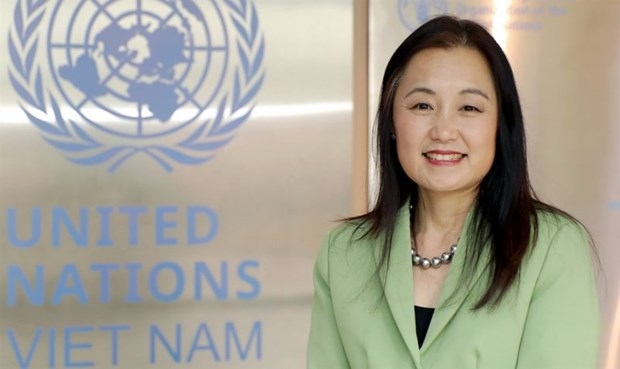UNFPA highlights youth’s role in achieving sustainable development
Naomi Karahara, UNFPA Representative in Vietnam, has highlighted young people as the key force to achieve the country’s agenda for sustainable development.

On the occasion of International Youth Day (August 12), the UNFPA Representative in Vietnam granted an exclusive interview to the Vietnam News Agency on the country’s youth development.
Following is the text of the interview.
- Thank you so much Ms. Naomi Kitahara for accepting VNA's interview request. First of all, will you kindly share with us your opinion about the role of the youth as a key force in achieving the 2030 Agenda for sustainable development goals in Vietnam?
Vietnam is experiencing a rapid demographic and social change. According to the results of the 2019 Population and Housing Census, Vietnam recorded the highest proportion of young people in the country’s history (20.4 million aged 10-24, accounting for 21 percent of the population). This indicates a special, demographic window of opportunity, with presence of what we call, a “demographic dividend,” that the country can capitalize to accelerate its socio-economic development if right policies are put in place for young people.
This is particularly so, when Vietnam is progressing well in the achievement of a number of SDG-related results, such as a reduction in the national multi-dimensional poverty rate from 9.9 percent in 2016 to 4.8 percent in 2020 and good annual GDP growth rates at 6.7 (2015), 6.2 (2016), and 7.02 percent (2019).
Clearly, young people are the key force to achieve the country’s agenda for sustainable development. But we need to invest in young people well, across a wide range of areas such as health, education, skills development, employment, and social justice including gender equality and the prevention of gender-based violence. We also need to create an enabling environment for young people’s participation in decision making, and empower them to play an increasing role in all social, economic, cultural and political spheres. Given the Government’s strategy of digital transformation as a key driver for development, and given the skillfulness of youth people in IT use, more opportunities and conditions should be given to young people.
In doing so, it is important to keep in mind that young people are not a homogenous group, and this should be taken into account when designing and implementing youth related policies at both national and sub-national levels. The consideration of diversity among young people can then facilitate their engagement and contribution to the country’s socio-economic development, leaving no one behind.
- As you mentioned, Vietnam is in the demographic window of opportunity in which 21 percent of the total population are young people, the largest amount in Vietnam’s history. However, an increasing number of older people will cause pressures on the country’s economy and society. What would be your recommendations to the Government of Vietnam to extend the window period and to optimise this opportunity?
Vietnam is going through a very interesting demographic shift at the moment. While the county has the largest number of young people in its history, the number of old people is also increasing.
Data from the 2019 Population and Housing Census shows that people aged 60 and above account for 11.9 percent of the population, or more than 11.4 million people, of which 58.1 percent are older women, and 67.1 percent live in rural areas. And population aging is progressing very fast in Vietnam. Such a major shift in the population structure is very important, highlighting the challenges of population ageing. But here, it is essential to point out that population aging happens not just because mortality declined, and people live longer, but also because fertility declined. With declines in fertility in the past decades, the proportion of old people in the total demographic structure has increased in Vietnam.
As the number of the elderly increases, different services do need to be provided, particularly in social protection, health care, and pension services And we do need to look at the fact that a lot of old people live alone, and many with disability, posing a unique life challenge for them. Also, elderly women are more likely to fall into poverty, and as such, feminization of aging, as well as feminization of poverty, has to be taken in to account in policy and decision-making. However, population aging can also present a new opportunity - employment for older persons should be looked at, adding the elderly to the country’s labour force, and new businesses can be introduced more for the care of old people.
In terms of the demographic window of opportunity, we advise the Government to fully utilize the life-cycle approach in its policy and decision making, so that young people are fully prepared for older age, and plan their lives accordingly. It is critical for the Government to make a smart investment in young people for their education and health care – including sexual and reproductive health, so that young people can contribute significantly to the country’s socio-economic growth, as responsible and mature citizens. Now is the once-off chance that Vietnam has to tap into the demographic dividend to accelerate and solidify the country’s socio-economic development.
- The young people are one of the vulnerable population groups who have been negatively affected by the COVID-19 pandemic. What would be the support from the UN in Vietnam in general and UNFPA in particular to this population group?
The COVID-19 pandemic and its socio-economic impact have revealed that in crisis and emergency situations, fragilities and weaknesses are exposed particularly in vital service provision, exacerbating existing inequalities. For inclusive and sustainable development towards the 2030 Agenda, these need to be addressed urgently, so as to build back better by avoiding any reversals in the developmental gains that Vietnam has achieved in the past decades.
With support from the Government of Japan, UNFPA works closely with the Government of Vietnam in mitigating the negative impact of COVID-19 on vulnerable populations. The new project has been designed to support the following four areas:
Domestic Violence/Gender Based Violence: enhancing integrated protection services for the survivors of DV/GBV and carrying out DV/GBV prevention work for behavioral change, through strengthening case management and coordination between sectors and raising awareness of the impact and consequences of DV/GBV;
Quality Care for Older People: ensuring that care for older people, particularly those with disabilities, is integrated and continuous during emergency situations and promoting greater private sector involvement in the care of the elderly;
Sexual and Reproductive Health: ensuring that continuous sexual and reproductive health services are guaranteed to women and young girls, with particular attention to ethnic minorities and those residing in remote and mountainous locations for human security; and
Young Returning Migrant Workers: providing Life Skills Education/Comprehensive Sexuality Education counselling and professional services on sexual and reproductive health, DV/GBV, job replacement, career planning and income generation for the empowerment of Vietnamese young people.
We trust that with this project, UNFPA can make a difference on the lives of vulnerable populations in Vietnam, minimizing the negative impact of the pandemic.
- In the context of the COVID-19 outbreak, what is your advice to young people to stay safe and to support the local community?
While COVID-19 tends to affect the elderly population more, it does not mean that young people can never be infected, nor that young people never develop severe conditions. As such, it is a must that all precautionary measures such as 5 K’s are used, and prevention actions as advised by national and local authorities are fully respected, by young people. Young people are in the same boat together with the rest of the Vietnamese population in the prevention of COVID-19. This is also to protect young people, their family, their loved ones, their communities, and their country.
At the same time, we need to be aware that young people are also sacrificing their lives. Their education and social life have been severely affected by COVID-19, and young people are equally suffering from the pandemic. It is therefore important that opportunities are created for young people to bring back their lives and pursue their educational and professional activities, as soon as the current COVID-19 wave is settled. We as adults have a huge responsibility to facilitate young people’s ambition, life-planning, and growth in Vietnam.
I salute young volunteers across the country, who are giving a helping hand to the areas which have been severely affected by COVID-19, hospitals and clinics, as well as care and support for vulnerable populations including the elderly, women, young children and people with disability. They are doing an incredible volunteer work to make it better, with a strong belief that together we can prevent and effectively respond to COVID-19. They are the hopes of Vietnam, and that is the reason why we celebrate the International Youth Day. Vietnam’s young people are beautiful – they are not the leaders for the future; they are the leaders today.
Many thanks to Ms. Naomi Kitahara, the United Nations Population Fund (UNFPA) Representative in Vietnam!


